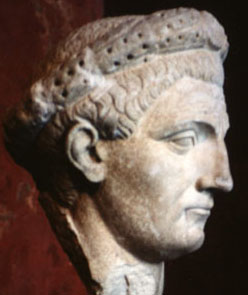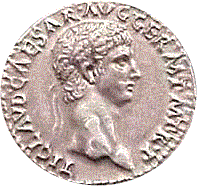Fourth Roman emperor. Tiberius Claudius Nero Germanicus was
the son of the emperor Tiberius'
younger brother Drusus
& Antonia,
the daughter of Marc
Antony & Octavia,
the sister of Augustus.
He would have been the normal choice to succeed Tiberius had the
imperial family not thought him unfit for the office. But when he
was found hiding in the palace after the assassination of his nephew
Caligula
(41
CE), the Praetorian guard made him emperor despite opposition in
the Senate.
Trained as a scholar by the historian Livy, Claudius had already produced massive histories of Rome, the
Etruscans, Carthage & his own family, which would have been
invaluable sources for modern scholars. But none of his literary
works [all in Greek] have survived. As an antiquarian, Claudius had
greater sympathy for the traditions of the old Roman Republic than
previous rulers of the house of Caesar. But an abortive rebellion in
the Senate only a year after he became emperor made him favor the
army.
Though not himself a soldier, Claudius was responsible for the
conquest of Britain where his troops proclaimed him a god (43 CE).
Instead of encouraging worship of the emperor in Rome, however, he
indirectly furthered the development of the imperial cult by
proclaiming his grandmother [Augustus' wife Livia]
a goddess. Elsewhere, Claudius' troops extended Rome's control over
all of north Africa, the Balkan peninsula & Asia Minor. Thus,
the first Roman emperor who had not been trained to be a soldier
pushed the boundaries of the empire to their greatest extent.
Claudius' major impact upon the Roman
world, however, came from his enlightened judicial & civic
reforms [including the extension of Roman citizenship] & his
policy of colonization in Britain, Germany & Gaul, which made
possible the survival of Roman culture even after the fall of Rome
to barbarians 400 years later. In the eastern provinces he relied on
the family of Herod
to rule regions outside Palestine. But after the death of his
friend Agrippa
I (44 CE), he returned Judea,
Samaria
& most of Galilee
to direct imperial control. While repeatedly issuing edicts to
safeguard tolerance of Jewish religion in the provinces, he is
reported to have (temporarily) exiled all Jews from Rome (51 CE) as
the result of an internal (Messianic?) dispute.
Though a successful administrator of
the empire, Claudius proved to be a less than enlightened head of
his own household. He divorced his 1st wife, executed his 2nd (for
publicly marrying her lover) & married his niece Agrippina
[Caligula's sister], who eventually poisoned him.
References: Josephus,
Antiquities
18.164-165;
19.102-103, 162-166, 212-268, 273-280, 360-361;
20.1-15, 131-137, 148-151.
_____, War 2.204-223,
244-248.
Acts 11:28, 18:2
Tacitus, Annals
11.1-4,8-9,11-15,25-38;
12.1-11,19-26,41-43,56-61, 65-69.
Suetonius, Lives of
Caesars: Claudius.
Other resources on line:


![]()
![]()

![]()
![]()
![]() Perspective on the
World of Jesus
Perspective on the
World of Jesus ![]()